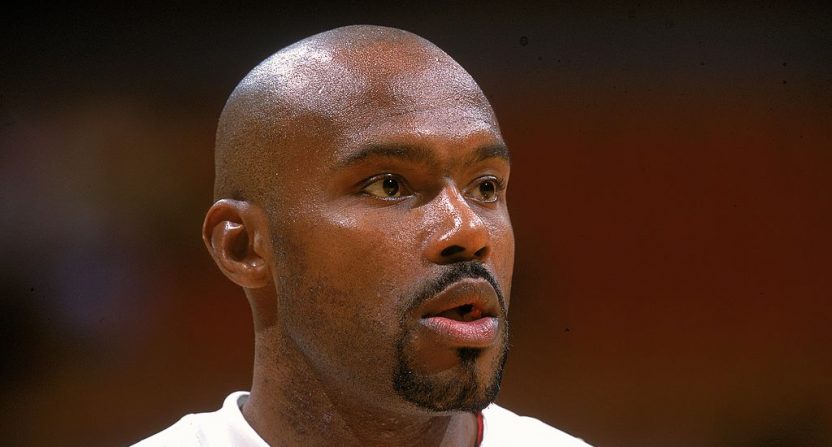Once upon a time, Tim Hardaway was a homophobe, and the whole world knew after he plainly proclaimed it on Dan Le Batard’s ESPN show in 2007. Since then, Hardaway has made an effort to help the LGBTQ community, and based on an interview with the Washington Post, the effort seems completely genuine and not just a way to repair his tarnished image:
“When I said what I said . . . I still cringe at it when I think about it, and [it] still hurts me deep inside that I said something like that because I gave people an opportunity to hurt people,” Hardaway said in a recent phone interview. “That wasn’t right . . . each and every day when I talk to kids today and they bring it up to me or somebody brings it up to me, I say that was a very big mistake on my part.
“It hurts me to this day, what I said, and you know what? It’s going to hurt me for the rest of my life, because I’m not that type of person. I feel bad about it, and I’m always going to feel bad about it.”
His actions over the last decade seem to show that what he says is legit.
He was a leader of the movement in Florida to legalize same-sex marriage and supported El Paso mayor John Cook when he allowed domestic partnership rights for gay and unmarried couples.
When Jason Collins came out in 2013 as the first openly gay active player in the NBA, Hardaway called him to offer support:
After the letter’s publication, [Collins] received a phone call from a number he didn’t recognize, bearing South Florida’s 305 area code. It was Hardaway, calling to offer his support.
“I remember seeing or hearing what he said,” Collins said in a phone interview Wednesday. “As a closeted athlete, that’s your biggest fear, coming out and being met with rejection openly.
“I have to say, I get asked what was the most surprising [call] after making my announcement, and, yes, getting the call from the president and Oprah and all of that was surprising. But getting a call from Tim Hardaway is right up there, because I didn’t know he had changed as a human being, as far as being what happened with his comments when Jon came out, and now becoming an ally.
“It shows the power of the coming-out story. It shows the power of John Amaechi’s story. Tim obviously said what he said and was met with a lot of criticism and was forced to look at himself in the mirror and has changed a lot. . . . I’m glad I answered the call and heard his words.”
Detroit Pistons coach Stan Van Gundy was an assistant in Miami when Hardaway played for the Heat, and then hired the former point guard as an assistant in Detroit in 2014. Van Gundy also thinks Hardaway’s transformation is authentic:
“I think what Tim had was a genuine change of heart,” Van Gundy said. “That is what he meant when he said it, and the incident made him stop and think about it and why he had the feelings he did.
“He had those feelings, he was forced to think about it, he changed his mind, he changed his heart, and there’s been nothing like that since. As a matter of fact, he’s gone out of his way to be supportive of the LGBTQ community. But the way he handled it to me speaks better of his character.”
The reason all this has been in the news recently is because Hardaway is one of the best players snubbed from the NBA Hall of Fame, but he could get finally get the nod this year at All-Star weekend. In the Washington Post article, Collins an Van Gundy both think Hardaway deserves to be inducted.
In 15 seasons, Hardaway averaged 17.7 points and 8.2 assists, made five All-Star games, and was named to an All-NBA team five times.
